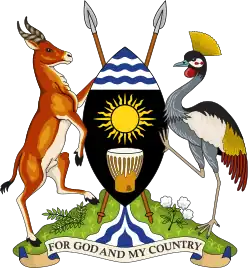Killing of disabled children in Uganda
In some parts of Uganda, disabled children are put to death. In traditional rituals, infant body parts are claimed to bring benefits. Those who continue these practices describe it as "mercy killing", meaning that the children are spared from enduring painful disabilities.[1]
Rituals
Process
Most of the time, a witch doctor will resort to these rituals to save the disabled children from their painful disability after the failure of multiple attempts using other methods that include herbal remedies or animal sacrifices which are less powerful.[2] During the rituals of child sacrifice, the witch doctor is in presence of his accomplices and starts by verifying any evidence of demonization in the child.[3] Then, he removes different parts of the child's body by force and uses the blood to make a potion mixed with herbs.[3] These body parts are mostly heads, genitals, eyes, tongues, limbs, teeth, and organs.[4] According to the perpetrators, these rituals are necessary to bring about success, healing or wealth.[2]
Practitioners
The killing of disabled children in Uganda is perpetrated by witchdoctors who praise the power of these rituals to their clients in search of wealth, health or fame.[5] Those witchdoctors are often compared to traditional healers which have resulted in the propaganda stating that witchcraft is associated with the healing practices of the indigenous culture although they are, in reality, responsible of horrible crimes unlike traditional healers who do not use human organs.[3] The parents of disabled children also play a major role in the rituals by allowing it and leading their children to death because they believe that the so-called 'mercy killing' would avoid them the pain of enduring these disabilities.[1]
Investigations
The parliament of Uganda highly condemns "mercy" killing of newborn disabled children in Uganda as they regard it as an inhumane act.[6]
Findings
The European Parliament was involved in finding resolutions for the killings of disabled people in Uganda. They argued that the killings should not take place because: human rights should be respected at all times, everyone has a right to life despite their disabilities.[7] People with disabilities are often excluded from community activities. Disabled children are usually hidden from the public, cast out, and even killed. Mothers of these children experience isolation from their extended families, while most of the fathers neglect their families. The Ugandan National Household Survey reports only record disabled people of age 5 and above, leaving out most children. 7.1% of Ugandans, which is equivalent to 2.1 million people, are reported to be disabled.[8]
Actions and penalties
In Uganda, the law prohibits discrimination against persons with physical, sensory, intellectual, or mental disabilities in employment, education, air travel and other transportation, access to health care, and the provision of other state services.[9] However, the government's efforts in enforcing these laws have not been effective.[9]
The form of treatment given to people with disability has not been encouraging of late. A July report released by the National Council on Disability (NCD) indicated 55 percent of persons with disabilities lacked functional literacy skills, and only 33 percent studied to primary grade seven.[9] The report found some children with mental disabilities were sometimes denied food and were tied to trees and beds with ropes in order to control their movements. The report further stated the needs of children with autism and learning difficulties were ignored due to an insufficient number of special needs schools.[9]
Government agencies responsible for protecting the rights of persons with disabilities included the Ministry of State for Disabled Persons, the NCD, and the Ministry of Gender, Labor, and Social Development, but these entities lacked sufficient funding to undertake any significant initiatives.[9]
In the government's effort to ensure that there is adequate representation of people with disability in roles of position, there are 5 seats in parliament which have been reserved for persons with disabilities.[10] This initiative is intended to empower a historically marginalized group.[11]
References
- "The untold story of 'mercy killing' of disabled children in Uganda". Daily Record. 26 February 2018. Retrieved 9 May 2018.
- "Where Child Sacrifice is a business". BBC News. 11 October 2011. Retrieved 24 April 2018.
- "Child Sacrifice". www.jubileecampaign.co.uk. Retrieved 24 April 2018.
- "Child Sacrifice in Uganda in a global context of cultural violence" (PDF). www.kidsrights.org. Archived from the original (PDF) on 17 September 2017. Retrieved 24 April 2018.
- "witch doctors in Uganda sacrificing children in bid to end drought". www.foxnews.com. 26 September 2017. Retrieved 24 April 2018.
- "MEPs condemn killings of disabled children in Uganda". 19 March 2018.
- "Motion for Resolution". Retrieved 24 April 2018.
- "Helping mothers and disabled children - Uganda - AfricaOur Work - Home -". www.malteser-international.org.
- Uganda 2012 Human Rights Report (PDF) (Report). Bureau of Democracy, Human Rights, and Labor. 2012.
- Read Final Report On Elections for Member of Parliament Representing People with Disabilities 2016 Archived 24 April 2018 at the Wayback Machine
- "Etiology of Physical Disabilities, Health Disabilities, and Related Low-Incidence Disabilities" (PDF). www.sagepub.com. Retrieved 16 October 2020.
